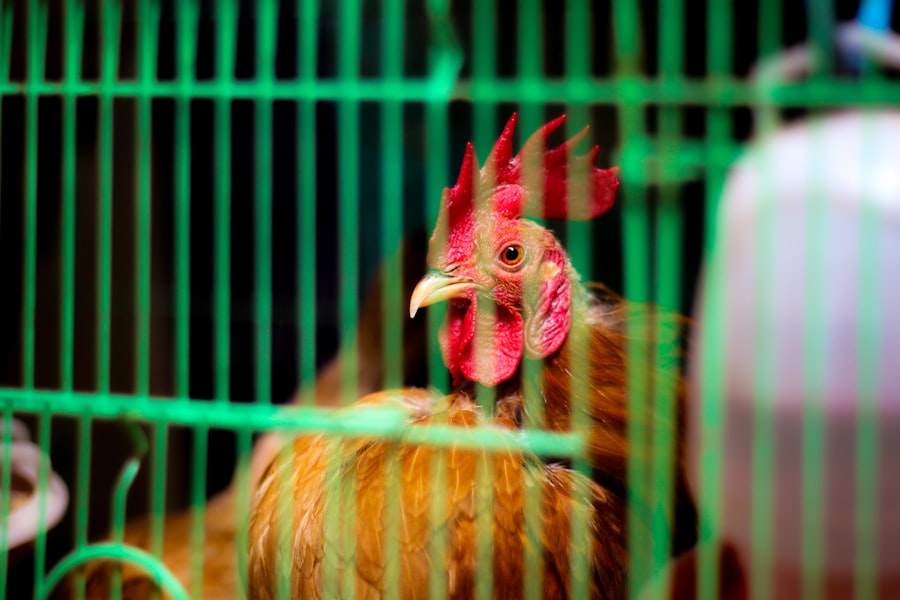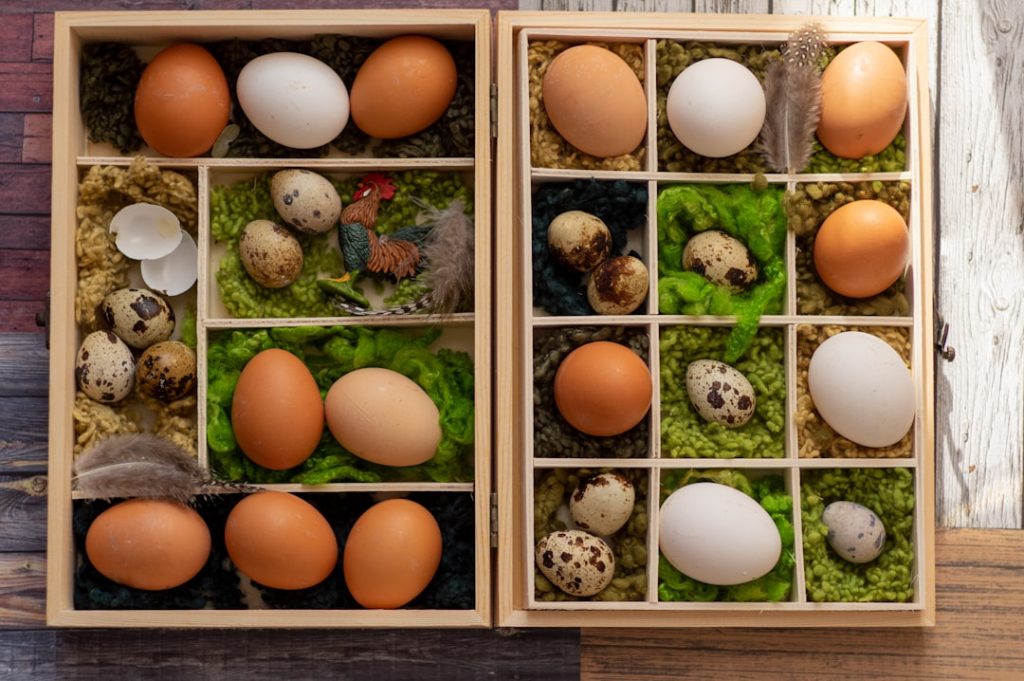Backyard chicken keeping is a fulfilling hobby that requires dedicated care and attention to maintain the health of your flock. Proper management of chickens involves several key aspects:
1. Nutrition: Providing a balanced diet tailored to the chickens’ age and purpose (egg-laying or meat production).
2. Housing: Ensuring a clean, dry, and well-ventilated coop with adequate space for each bird. 3.
Hygiene: Regular cleaning of the coop and surrounding areas to prevent disease transmission. 4. Health monitoring: Conducting routine health checks to identify potential issues early.
5. Parasite prevention: Implementing measures to control internal and external parasites. 6.
Disease management: Understanding common chicken ailments and their treatments. 7. Predator protection: Safeguarding the flock from potential threats such as foxes, raccoons, and birds of prey.
8. Environmental enrichment: Offering activities and spaces for natural behaviors like dust bathing and foraging. By addressing these aspects of chicken care, backyard keepers can maintain a healthy and productive flock.
Regular veterinary consultations and staying informed about best practices in poultry management are also essential for successful chicken keeping.
Table of Contents
- 1 Proper Nutrition and Feeding
- 2 Providing a Clean and Safe Environment
- 3 Regular Health Check-ups and Vaccinations
- 4 Parasite Prevention and Control
- 5 Maintaining Good Hygiene Practices
- 6 Recognizing and Managing Common Health Issues
- 7 FAQs
- 7.1 What are some common health issues that backyard chickens may face?
- 7.2 How can I prevent health issues in my backyard chickens?
- 7.3 What should I include in my backyard chickens’ diet to keep them healthy?
- 7.4 How can I keep my backyard chickens’ coop clean and sanitary?
- 7.5 What are some signs that my backyard chickens may be unwell?
Key Takeaways
- Backyard chicken health is important for their well-being and productivity.
- Proper nutrition and feeding are essential for maintaining the health of backyard chickens.
- Providing a clean and safe environment helps prevent diseases and infections in backyard chickens.
- Regular health check-ups and vaccinations are crucial for preventing and managing diseases in backyard chickens.
- Parasite prevention and control are important aspects of maintaining the health of backyard chickens.
Proper Nutrition and Feeding
Nutritional Essentials
In addition to commercial feed, chickens can also benefit from kitchen scraps, fruits, vegetables, and even the occasional treat such as mealworms or sunflower seeds. However, it’s important to avoid feeding them foods that are high in salt, sugar, or fat, as these can be harmful to their health.
Feeding Schedule and Monitoring
By providing a balanced diet and monitoring their food intake, you can help ensure that your chickens receive the nutrients they need to stay healthy and productive. Chickens should be fed at least twice a day, with the amount of feed adjusted based on their age, size, and activity level. It’s also important to monitor their food consumption and make adjustments as needed to prevent obesity or undernourishment.
Promoting Overall Health and Well-being
By paying attention to their nutritional needs and feeding them a balanced diet on a regular schedule, you can help promote the overall health and well-being of your flock. Remember to provide access to fresh, clean water at all times, as dehydration can lead to serious health issues.
Providing a Clean and Safe Environment
Creating a clean and safe environment is crucial for maintaining the health of backyard chickens. This includes providing adequate shelter, protection from predators, and a clean living space. A well-ventilated coop with proper insulation can help regulate temperature and prevent the buildup of moisture, which can lead to respiratory issues and other health problems.
It’s important to regularly clean the coop, removing soiled bedding and waste to prevent the spread of bacteria and parasites. Providing clean nesting boxes and perches can also help prevent the spread of disease and ensure the comfort of your flock. In addition to maintaining a clean living space, it’s important to protect your chickens from predators.
This may involve installing fencing or netting around their outdoor area, securing the coop at night, and providing adequate shelter from extreme weather conditions. By creating a safe and secure environment for your flock, you can help minimize stress and reduce the risk of injury or illness. Regularly inspecting the coop and outdoor area for potential hazards can help identify and address any safety concerns before they become a threat to your chickens’ health.
Regular Health Check-ups and Vaccinations
Regular health check-ups are an important part of maintaining the overall well-being of backyard chickens. This may involve monitoring their behavior, appearance, and egg production on a daily basis, as well as conducting more thorough health assessments on a regular basis. By familiarizing yourself with the normal behavior and appearance of your flock, you can quickly identify any changes that may indicate an underlying health issue.
This includes monitoring their activity level, appetite, droppings, feather condition, and overall appearance. In addition to regular health check-ups, vaccinations can help protect your flock from common diseases. Some vaccinations are recommended for all chickens, while others may be specific to certain regions or environments.
It’s important to consult with a veterinarian or poultry specialist to determine which vaccinations are necessary for your flock based on their age, breed, and potential exposure to disease. By staying up-to-date on vaccinations and conducting regular health check-ups, you can help prevent the spread of disease and ensure the long-term health of your flock.
Parasite Prevention and Control
Parasites such as mites, lice, and worms can pose a serious threat to the health of backyard chickens. These pests can cause irritation, anemia, weight loss, and even death if left untreated. To prevent infestations, it’s important to regularly inspect your flock for signs of parasites and take proactive measures to control their presence.
This may involve using dust baths, diatomaceous earth, or other natural remedies to repel parasites from the coop and outdoor area. Additionally, providing regular access to clean soil or sand can help chickens naturally control parasites through dust bathing. In addition to proactive measures, it’s important to administer regular deworming treatments as recommended by a veterinarian or poultry specialist.
This can help prevent internal parasites from causing harm to your flock and ensure that they remain healthy and productive. By staying vigilant and taking proactive measures to prevent and control parasites, you can help protect the overall health and well-being of your backyard chickens.
Maintaining Good Hygiene Practices

Personal Hygiene Practices
This includes practicing proper handwashing techniques before and after handling chickens or their eggs, as well as regularly cleaning and disinfecting equipment such as feeders, waterers, and egg collection baskets.
Biosecurity Measures
It’s also important to practice biosecurity measures to prevent the introduction of disease-causing agents into your flock. This may involve limiting contact with other poultry flocks, quarantining new birds before introducing them to your existing flock, and preventing wild birds or rodents from accessing the coop or outdoor area.
Flock Hygiene Monitoring
In addition to practicing good hygiene yourself, it’s important to monitor the hygiene of your flock. This includes regularly inspecting their feathers, feet, beaks, and vents for signs of dirt or matted feathers that may indicate poor hygiene or potential health issues.
By maintaining good hygiene practices for yourself and your flock, you can help prevent the spread of disease and ensure that your chickens remain healthy and productive.
Recognizing and Managing Common Health Issues
Despite your best efforts to maintain the health of your backyard chickens, it’s possible for them to experience common health issues from time to time. This may include respiratory infections, egg-laying problems, injuries, or digestive issues. By familiarizing yourself with the signs and symptoms of common health issues in chickens, you can quickly identify when intervention is necessary and take appropriate measures to address the problem.
In addition to recognizing common health issues, it’s important to have a plan in place for managing them effectively. This may involve consulting with a veterinarian or poultry specialist for guidance on treatment options, administering medications as directed, isolating sick birds from the rest of the flock, or providing supportive care such as supplemental heat or hydration. By staying informed about common health issues in chickens and having a plan in place for managing them effectively, you can help ensure that your flock receives prompt care when needed.
In conclusion, maintaining the health of backyard chickens requires a combination of proper nutrition, a clean environment, regular health check-ups, parasite prevention, good hygiene practices, and proactive management of common health issues. By staying informed about the needs of your flock and taking proactive measures to promote their overall well-being, you can enjoy the rewards of raising healthy and productive chickens in your backyard.
If you’re interested in keeping backyard chickens healthy, you may also want to consider the interior design of your chicken coop. This article offers some great ideas for creating a comfortable and safe environment for your feathered friends. A well-designed coop can contribute to the overall health and well-being of your chickens.
FAQs
What are some common health issues that backyard chickens may face?
Some common health issues that backyard chickens may face include respiratory infections, parasites (such as mites and lice), egg binding, and nutritional deficiencies.
How can I prevent health issues in my backyard chickens?
To prevent health issues in backyard chickens, it is important to provide a clean and well-maintained coop, offer a balanced diet, practice good biosecurity measures, and regularly monitor the health of your chickens.
What should I include in my backyard chickens’ diet to keep them healthy?
A healthy diet for backyard chickens should include a balanced commercial feed, fresh water, and access to grit and oyster shell for calcium. Additionally, offering occasional treats such as fruits and vegetables can provide added nutrition.
How can I keep my backyard chickens’ coop clean and sanitary?
To keep your backyard chickens’ coop clean and sanitary, regularly remove soiled bedding, clean and disinfect water and feed containers, and regularly inspect for signs of pests or disease. Proper ventilation and adequate space are also important for maintaining a healthy coop environment.
What are some signs that my backyard chickens may be unwell?
Signs that your backyard chickens may be unwell include decreased egg production, changes in behavior or posture, abnormal droppings, respiratory symptoms, and visible signs of injury or illness such as lethargy or feather loss. Regularly monitoring your chickens’ health and behavior can help you identify potential issues early.
Meet Walter, the feathered-friend fanatic of Florida! Nestled in the sunshine state, Walter struts through life with his feathered companions, clucking his way to happiness. With a coop that’s fancier than a five-star hotel, he’s the Don Juan of the chicken world. When he’s not teaching his hens to do the cha-cha, you’ll find him in a heated debate with his prized rooster, Sir Clucks-a-Lot. Walter’s poultry passion is no yolk; he’s the sunny-side-up guy you never knew you needed in your flock of friends!







